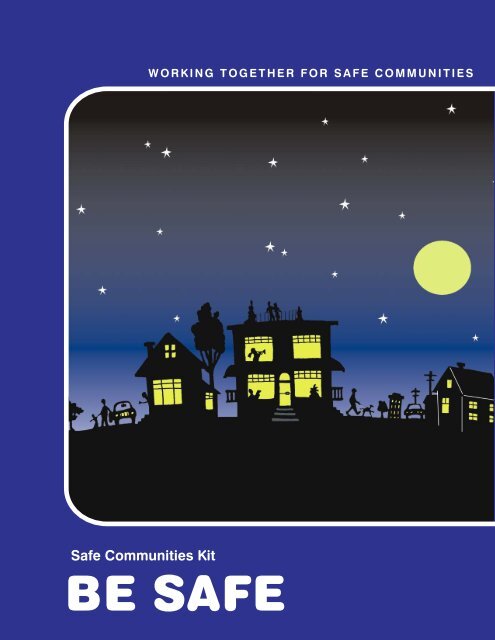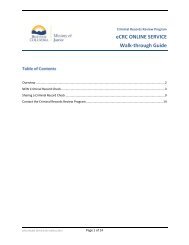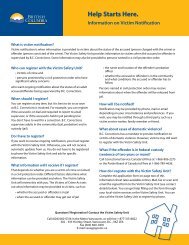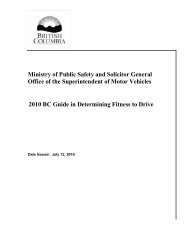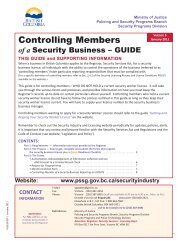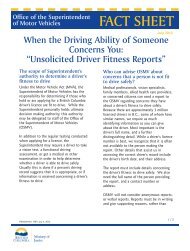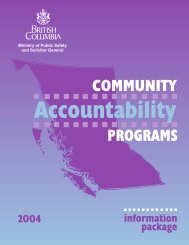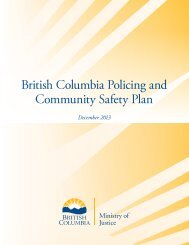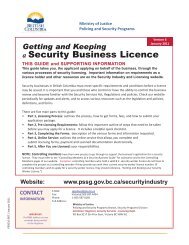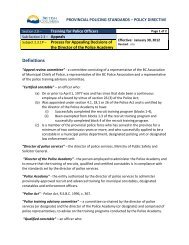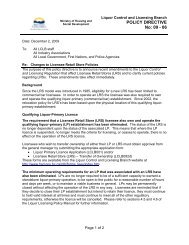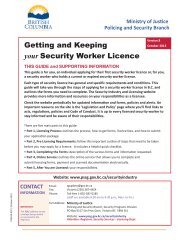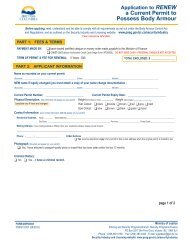Safe Communities Kit: Be Safe - Ministry of Justice
Safe Communities Kit: Be Safe - Ministry of Justice
Safe Communities Kit: Be Safe - Ministry of Justice
- No tags were found...
Create successful ePaper yourself
Turn your PDF publications into a flip-book with our unique Google optimized e-Paper software.
SAFE COMMUNITIES KITWelcome to the<strong>Safe</strong> <strong>Communities</strong> <strong>Kit</strong>The <strong>Be</strong> <strong>Safe</strong> guide forms part <strong>of</strong> a series <strong>of</strong> booklets published for inclusion in BritishColumbia's <strong>Safe</strong> <strong>Communities</strong> <strong>Kit</strong>. The <strong>Safe</strong> <strong>Communities</strong> <strong>Kit</strong> was developed to assistcommunities and individuals in preventing crime and enhancing safety across BritishColumbia.Other <strong>Safe</strong> <strong>Communities</strong> <strong>Kit</strong> booklets include: An Overview <strong>of</strong> Crime Prevention and Community <strong>Safe</strong>ty Planning Identifying Your Community's Crime Problem: A Guide to NeedsAssessment Getting Your Crime Prevention Strategies Underway: Project PlanningGuide Splash and Ripple: Using Outcomes to Design and Guide Community<strong>Justice</strong> Work Working with the MediaAll <strong>of</strong> these booklets are available on the <strong>Safe</strong> <strong>Communities</strong> <strong>Kit</strong> CD-ROM and can bedownloaded from the <strong>Communities</strong> Programs Division website atwww.pssg.gov.bc.ca/community_programs.For more information contact:Community Programs DivisionPolicing and Community <strong>Safe</strong>ty Branch<strong>Ministry</strong> <strong>of</strong> Public <strong>Safe</strong>ty and Solicitor General201-4180 Lougheed HighwayBurnaby, BC V5C 6A7Telephone: 604-660-2605Toll-Free: 1-866-668-2137Facsimile: 604-775-2674e-mail: SGCPD@gems2.gov.bc.cawebsite: www.pssg.gov.bc.ca/community_programs2
WORKING TOGETHER FOR SAFE COMMUNITIESTABLE OF CONTENTS1. PERSONAL SAFETY.........................................................................4Learn the basics for staying safe whether you areout and about or inside your own home. IncludesSpecial advice for seniors.2. FAMILY SAFETY.............................................................................10Keep children out <strong>of</strong> harm’s way. Includes great tips forenhancing child and youth safety, as well as informationabout the Internet, television and more.3. HOME AND POSSESSIONS SAFETY............................................... 16Take steps to prevent theft. Find out how to protect yourhome, vehicle and bank cards, and how to detectand prevent fraud.4. COMMUNITY SAFETY................................................................... 22Ideas on how you can make a difference in yourCommunity.5. SAFETY CHECKLIST..................................................................... 236. EMERGENCIES AND HOW TO GET HELP FAST.............................. 247. NEIGHBOURHOOD TREE..............................................................26Working Together ForSAFE COMMUNITIESB.C.’s Provincial <strong>Safe</strong> <strong>Communities</strong> Working Group provided the expertiseand advice needed to prepare this kit. The working group includesrepresentatives from:• B.C. Block Parent Society• B.C. Block Watch• B.C. Coalition for <strong>Safe</strong>r <strong>Communities</strong>• B.C. Crime Prevention Association• B.C. Association <strong>of</strong> Municipal Chiefs <strong>of</strong> Police• B.C. Youth Police Network• Children <strong>of</strong> the Street Society• Community Programs Division, <strong>Ministry</strong> <strong>of</strong> Public <strong>Safe</strong>tyand Solicitor General• B.C. Crime Stoppers• B.C. <strong>Safe</strong> Schools and <strong>Communities</strong> Centre• National Crime Prevention Centre• RCMP “E” Division• Union <strong>of</strong> B.C. Municipalities3
SAFE COMMUNITIES KIT1. PERSONAL SAFETYWhen out, stay alert, stand tall and act confident;most would-be criminals will decide you’re the wrongperson to approach. If you feel uneasy walking alone,walk with someone or carry a whistle or other personalsafety alarm. At night, use well-lit busy streets, and keepto the middle <strong>of</strong> the sidewalk.If you carry a purse, hold it close to your body with onehand over the opening. <strong>Be</strong>tter yet, use a waist/fannypack. Your wallet is safer in a front or inside pocket thanin a back pocket. Keep your house keys in your pocket,not in a backpack or purse.Avoid carrying large amounts <strong>of</strong> cash. If you mustcarry cash, be discreet when you make purchases.Always watch for public phones or places whereyou can get help on your route. Free emergencyassistance is always available by dialing “0”. Have yourkey ready when approaching your home or car.Vary your daily routine to avoid establishingpredictable patterns that could place you at risk.Running, Walking,RollerbladingPersonal stereos with headphones make it harderto hear an approaching person or vehicle. Make sureyou are facing the flow <strong>of</strong> traffic so you can seeoncoming cars.wearing their seat belts.Lock all doors whether you are inside or outsideyour vehicle. Don’t pick up hitchhikers.Make sure your car is in good repair, have enoughgas to reach your destination and know your route.Store a flashlight or flare in your car. If you arestopped by mechanical problems and someone<strong>of</strong>fers to help, have them call for assistance. Stay inyour car, and don’t accept a ride.Travelling By CarPark in open, well-lit areas. Visually check yourcar’s interior before getting in.Make sure your children are in the right type <strong>of</strong>child restraint and that all vehicle occupants are4
WORKING TOGETHER FOR SAFE COMMUNITIESUsing Public TransitPlan your route and know the transit schedule beforeyou leave home. Choose busy, well-lit bus stops afterdark.When travelling by bus late at night, ask to be let <strong>of</strong>fcloser to your street or door.At night, sit near the driver on empty buses. OnSkyTrain, scan the train interior before boarding toensure you feel comfortable and that there are otherpassengers on board. Choose a seat near the middle <strong>of</strong>the train. If someone bothers you or you feel threatened,move to another seat and notify someone as soon aspossible.Travelling By TaxiMake sure the taxi that arrives is the one you ordered.If you have any doubts about your safety, don’t get in. Ifyou feel uneasy once you are underway, ask to be let out in a well-lit, public place.If you are travelling alone, ask for a room beside themanager’s unit or on the second floor or higher. Keepyour hotel door and windows locked at all times. Ask thehotel not to give out your name or room number.Look through the peephole before answering thedoor. If you’re the least bit suspicious, keep the doorclosed and check with the front desk.Don’t leave valuables, especially cash, passports,traveller’s cheques, airline tickets, or credit cards, in yourhotel room. Keep them in the hotel or room safedepositbox, or take them with you.When walking in unfamiliar areas, ask hotel staff torecommend the safest route. Carry as little cash aspossible. Use traveller’s cheques and credit cards andkeep a record <strong>of</strong> their numbers in a separate and safeplace.Use a business or friend’s address on your luggagetags so you don’t alert potential thieves that you areaway.Travelling Out Of TownMake reservations so you know you’ll have a placeto stay.While You’re AwayUse lights and sound to make it appear as thoughsomeone is home. Place light timers in the living roomand at least one bedroom. Set them to come on after5
SAFE COMMUNITIES KITcan and call 9-1-1 or the local emergency number. If youcannot get out, phone for help as soon as you can do sosafely.Helping Othersdark, and to turn <strong>of</strong>f around the time you would normallygo to bed. Use a timer to turn on the TV or radio. Thisworks especially well during the day, when most “breakand enters” occur.Double-check all windows and doors to makesure they’re locked. Suspend newspaper and maildeliveries, or have someone reliable collect your maileach day. Arrange to have your yard maintained ifyou’re planning an extended trip.Give a neighbour, relative or friend your house key,itinerary, and phone numbers where you can bereached. If they can, ask them to check your homeperiodically.If You Find Yourself AtRiskMake sure your behaviour is non-threatening toothers. If you’re walking in the same direction as aperson on their own, don’t walk behind them. Cross theroad and walk on the other side. When using publictransit, don’t sit too close to someone who’s alone.<strong>Safe</strong> At HomeGet into the habit <strong>of</strong> keeping doors and windowslocked, even when you’re at home. When moving into anew home, install new locks or rekey the old ones.Use only your first initials with your surname in thephone book, on your mailbox, or on your apartmentdirectory.Keep a list <strong>of</strong> emergency numbers near the phone.You’ll find a handy place to list them on page 25.Get to know your neighbours. They can help makeyour community a safe, friendly place. We’ve included aNeighbourhood Tree on pages 26-27 to help you getstarted.Trust your instincts. If you think you are beingfollowed, either on foot or in your vehicle, or if you feel atrisk in any way, go to the nearest safe or public place forhelp.If verbally harassed, don’t respond, just keep moving.The best way to draw attention is to scream. If someonedemands your money or valuables, let them have them.If someone has broken into your home, do not goinside. Call police from a safe location. If you are athome and suspect a thief is in your house, get out if you6
WORKING TOGETHER FOR SAFE COMMUNITIESAnswering The Door<strong>Be</strong>fore opening your door, use a peephole orintercom to verify who is there. If you’re in a wheelchair,install peepholes at an accessible level. Don’t trust asecurity chain to protect you if you open the door.<strong>Be</strong> suspicious <strong>of</strong> unexpected visits from salespeopleor repair companies. It could be a burglar assessingyour possessions and security arrangements. Ask foridentification. Once you have seen it, ask for secondaryidentification such as a telephone number that you cancall to verify the person’s status.If a stranger needs to use your phone, you can help outwithout letting them into your home. Make the call forthem while they remain outside. Make it clear you’re notalone, even if you are. Call out to “someone” in anotherroom.Trust your instincts. If you don’t feel right aboutopening the door for any reason, don’t!If You Live In AnApartmentDon’t let people into the building or “buzz-them-up”unless you know who they are. If someone wants toenter the building, refer them to the manager. If youhave food or products delivered, pick them up at thebuilding’s front door if possible. Check with yourbuilding manager before changing the locks on yourapartment door.Never give out personal or family information overthe phone. Make sure children know how to answer thephone without providing information. Practise withthem.Don’t answer questions about your belongings,credit card numbers, bank accounts, or SocialInsurance Number. You are never required toparticipate in phone surveys or answer questions overthe phone.Give as little information as possible when recordinga message on your answering machine. Don’t revealyour name, when you plan to return home, and don’tsay you’re not at home. Don’t broadcast the fact that youlive alone – leave an answering machine message thatsays “we” can’t take your call.Answering The PhoneInformation is a powerful tool for criminals, andthe telephone can be an easy, anonymous way for themto gather it.7
SAFE COMMUNITIES KITAbusive Or ObscenePhone CallsThe best way to deal with an abusive or obscenephone call is simply to hang up. If the calls continue,here are simple and effective ways to deal with them:Record the date and time <strong>of</strong> the call, and then havethe call traced by dialing * 57 (a service provided by BCTEL in most areas <strong>of</strong> the province) immediately after youhang up. The caller’s number, your number and thetime <strong>of</strong> the call are recorded by the phone company.After tracing three calls, contact the local police.Telephone call information will only be released to thepolice.Ask your phone company about services like callname and number display and *69 call return, whichcan also help you identify the caller.<strong>Safe</strong>ty In PersonalRelationshipsAbuse can be physical, sexual, emotional,psychological or verbal. Any type <strong>of</strong> abuse is harmfulbut some, like assault, are crimes; even whencommitted by a family member or someone you know.If you are assaulted, get help immediately. Call 9-1-1 oryour local emergency number or go directly to the policeor hospital.If you are concerned about your safety or if you havebeen a victim <strong>of</strong> an assault or any other crime, you cancall the Victim Information Line at 1-800-563-0808 forinformation about help available in your community.Violence AgainstWomenViolence against women in relationships is not aprivate, family matter.Assault and stalking are crimes. If you are beingassaulted or harassed call the Police.To keep you and your children safe, have a safety planwhether you’ve decided to leave or stay in yourrelationship.8
WORKING TOGETHER FOR SAFE COMMUNITIESMemorize the telephone number <strong>of</strong> a transitionhouse or safe home for women, and plan where youcan or will go if you decide to leave.Seniors’ <strong>Safe</strong>tySeniors can sometimes feel vulnerable, especiallysince con artists <strong>of</strong>ten target them. If you have elderlyneighbours, get to know them and keep an eye out forthem. If you see anything that worries you, call thepolice.Lock up; even if you’re at home or just stepping outfor a moment. Keep valuables in a safety deposit box.<strong>Be</strong> particularly wary <strong>of</strong> anyone <strong>of</strong>fering bargains orprizes over the phone. Many con artists use the phoneto reach seniors. If you belong to a senior activity centreor social club, ask them to get the police or otherexperts to speak to you on crime prevention.Never keep large amounts <strong>of</strong> money on your personor in your home. It is safer in a bank. Only withdrawenough money to meet your immediate needs. Pay billswith cheques, credit cards or debit cards, or useAutomated Teller Machines (ATMs) or telephonebanking.9
SAFE COMMUNITIES KIT2. FAMILY SAFETYHelp your children identify threats to their safety. Thebest protection a child carries is knowledge. Teachchildren about personal safety. It’s their right to feel safe.Make sure they know that:They can tell you anything. Explain that you alwayswant to know what happens to them, especially ifsomeone says it’s a secret and that secret makes thechild feel unhappy or upset. You will believe them, andyou will not be angry.Their body belongs to them. No one, not even afriend or a relative, is allowed to touch their body in away that makes them feel uncomfortable.It’s OK to say no, even to an adult, about anything theyfeel threatens their <strong>Safe</strong>ty.They must never talk to strangers who approachthem. They must ignore a stranger’s <strong>of</strong>fer <strong>of</strong> candy, a giftor a ride. They must not help a stranger look for a lostanimal.If they are scared, they should run and get help.Child ProtectionIt takes a community to provide a safe place forchildren to grow. If you suspect a child has been or isbeing harmed, you are legally obligated to call theHelpline for Children by dialing 310-1234, fromanywhere in the province. Abuse can include physicalpunishment, deprivation <strong>of</strong> food, shelter, medicalattention or supervision. Children may also beemotionally neglected if they are deprived <strong>of</strong> attention oraffection. You can also get more information through theVictim Information Line 1-800-563-0808.Other Practical Steps:Make sure organizations <strong>of</strong>fering activities to yourchildren thoroughly check staff and volunteers. Showyour children the safest route to school, and encouragethem to walk with siblings or friends.Tell your children how important it is to stay close toyou when you’re in public places. Tell them what theyshould do if you become separated.Teach them important telephone numbers. Givethem opportunities to practise with the phone at homeand with pay phones. Give them a code word to use inemergencies.Listen carefully to them. They may be trying to tellyou something that is bothering them, or you may seechanges in their behaviour.BulliesChildren who bully are seeking a sense <strong>of</strong> power,and use intimidation and aggressive behaviour toachieve it. To help your children avoid becoming victims:Encourage them to deal with bullying situations. If10
WORKING TOGETHER FOR SAFE COMMUNITIESthey can, they should find a safe way to tell the personwho is bullying them how they feel. If they can’t, theyshould find someone to help them approach and talk tothe person.Explain that they should never risk being hurt. Ifsomeone wants their money, jacket or bag, they shouldgive it to them. Have them tell someone they trustafterwards, like a teacher or parent.Encourage them to help others who are beingbullied by finding a teacher, parent or youth worker andletting them know about the situation. If your child isbeing bullied, alert their school to the problem.Choosing A BabysitterWhen you’re away, you can ensure your children’ssafety by choosing the right babysitter. Ask yourneighbours to recommend someone they’ve used. Getto know the babysitter in advance. Make sure thebabysitter gets along with your children.Make a list <strong>of</strong> instructions for your babysitter to follow.Leave a list <strong>of</strong> contact and emergency phone numberswith the babysitter. Discourage visits from thebabysitter’s friends. Check-in with your babysitter.Ask for and listen to your child’s comments about thebabysitter.Tips For BabysittersConsider taking a babysitter’s course, availablethrough school or community groups.Let your family know where you’re babysitting, thephone number, and what time you expect to be home.Lock the doors after the parents leave.Don’t tell callers you are babysitting. Simply say theparents are not available right now and take amessage. Ask for a ride or an escort home after dark.11
SAFE COMMUNITIES KITStreet Wise YouthAs children grow older, the challenges they encounterbecome increasingly complex. Parents can help bycontinuing to encourage their children to exercise goodjudgement. You can help young people by encouragingthem to read the following safety suggestions, whichwill help them deal with any new situations they mayface.Don’t react to violence with more violence. Settlearguments with words, not fists or weapons. Avoidforming an audience when others argue.There are groups <strong>of</strong> bullies who band together in“wannabe” gangs. Don’t draw attention to their actions;that’s what they want.Refuse to hang around with friends who plan tosteal, vandalize or commit other crimes.If you’re in a situation and need advice on how toprevent crime or violence, call the Youth AgainstViolence Line (anonymously, if it makes you feel safer).You will receive assistance from school liaison or a youthpolice <strong>of</strong>ficer in your community. It’s a safe, simple andconfidential way to get help and prevent crime.Call the Youth Against Violence Line at 1-800-680-4264 or go to www.takingastand.com to e-mail theLine.If you become the victim <strong>of</strong> harassment, violence ortheft, or if you’re in a situation and you don’t know whatto do, tell someone who can help or call the YouthAgainst Violence Line.12
WORKING TOGETHER FOR SAFE COMMUNITIESTake a stand. When you see or hear something youknow is wrong, speak up or get help. The less youtolerate violence, the less it will happen.<strong>Safe</strong> Datingwith information and ideas to help you and your peerstake action to prevent crime and violence.For more information about the Taking a Stand <strong>Kit</strong>,call the Youth Against Violence Line at 1-800-680-4264, or visit the Taking a Stand website atwww.takingastand.com .Learn how to stop an unwanted sexual advance orany behavior that makes you feel uncomfortable. Youhave the right to say no. No, means no! No matterwhat’s happened. <strong>Be</strong> direct and assertive. Let your dateknow your limits clearly and firmly.If you don’t know your date well, stay in public placeswith other people. Tell a parent or friend where you’regoing. <strong>Be</strong> prepared to find your own way home. Carrymoney for a cab or transit, or call someone for a ride.<strong>Be</strong> aware that alcohol and drugs reduce your ability tothink clearly and make good decisions. Don’t accepthurtful behaviour from a boyfriend or girlfriend.Youth ActionOne way that youth can take a stand against violenceand crime is by getting a copy <strong>of</strong> the Taking a StandYouth Crime Prevention <strong>Kit</strong>. Taking a Stand is packed13
SAFE COMMUNITIES KITChildren And TheInternetThe Internet is a wonderful source <strong>of</strong> information,education and entertainment. It gives children access toa large amount <strong>of</strong> diverse material, some <strong>of</strong> which maybe inappropriate. Fortunately, there are effective ways tokeep this material inaccessible to children.Monitor InternetActivityOne <strong>of</strong> the best means <strong>of</strong> Internet control is diligentmonitoring by parents. Sit with your children while theynavigate the Internet, see where they go, and point outany material they should avoid. <strong>Be</strong> frank with childrenabout material that is inappropriate, like pornography,violence and hate literature, and limit the time yourchildren spend on the Net. Here are some other thingsto consider:Install filtering s<strong>of</strong>tware. There are two basic types<strong>of</strong> monitoring s<strong>of</strong>tware:Blocking s<strong>of</strong>tware stops children from accessingsites with adult material.Filtering s<strong>of</strong>tware prevents sites with chosen“keywords” from being accessed. Filtering can also stopchildren from sending personal information over theInternet.Choose an Internet Service Provider that providesinformation and access to parental control features.14
WORKING TOGETHER FOR SAFE COMMUNITIESPrivacy And TheInternetMakesure children know they should:Never divulge personal information, includingnames, addresses, credit card or phone numbers,passwords, or any information someone could use t<strong>of</strong>ind out who you are or where you live. Never answermessages or mail that are inappropriate, hostile, orseem scary.Let you know immediately if they find somethingthreatening or frightening on the Internet and that theyshould never arrange to meet with someone they’vemet through the Internet, unless you go with them.<strong>Safe</strong> Television ViewingStudies have shown the environment you providefor your children far outweighs the influence <strong>of</strong> TV. Thefollowing tips will help you make television a positivepart <strong>of</strong> your children’s environment:Watch TV with your children and interpret thematerial for them. Let them know “what is” and “what isnot” acceptable to watch.Make sure your children understand the differencebetween make-believe and reality.Reduce television’s influence by encouragingeveryone in the family, including adults, to get involvedin a diverse range <strong>of</strong> activities.15
SAFE COMMUNITIES KIT3. HOME AND POSSESSIONS SAFETYProperty crimes account for more than 60% <strong>of</strong> allcrimes. When you take the time to improve the security<strong>of</strong> your home and belongings, you contribute to thesafety <strong>of</strong> your community.Exterior wood doors should be a minimum <strong>of</strong> 1 ¾”thick and made from solid or laminated wood.Reinforce your door if necessary and make sure allhinges are on the inside.Rather than leave spare keys under the doormat oroutside your home, leave a spare set with a neighbour,friend or relative.Cut back trees and bushes, and keep your house welllit, especially around entrances and the driveway. Keepbasement windows in plain view. Put bars on lowerlevel windows, which can be removed in case <strong>of</strong> fire.Install motion-sensing spotlights on the corners<strong>of</strong> your home to light large areas.Identify all points <strong>of</strong> entry into your house andmake sure each <strong>of</strong> them is secure. Keep garage doorslocked with a sturdy lock, preferably sliding bolts.Some Other Things ToHelp You Keep YourHome <strong>Safe</strong>:If you have “key-in-the-knob” lockson your doors, add a deadbolt orinterlocking bolt lock for extrareinforcement. Secure the strike platethat holds the lock in place with 3” to 3½” screws. Deadbolt locks work bestwhen they are made <strong>of</strong> solid metal,have a minimum 1” bolt, contain acylinder guard, and are installed withhardened steel screws.Protect sliding windows with a metal bar or sturdystick like a hockey stick cut to fit snugly along the bottomtrack. Install screws or shims in the upper track <strong>of</strong> slidingglass doors to prevent the door from being lifted out <strong>of</strong>its frame. Install a keyed-slide bolt in the bottom track tokeep sliding doors from being forced open.Replace the latch on double-hung windows (onesthat slide up) with a keyed lock latch. Don’t forget to keepthe key close by in case <strong>of</strong> fire.16
WORKING TOGETHER FOR SAFE COMMUNITIESAutomatic garage door openers allow you tostay in your vehicle until safely inside the garage, andthey help to keep intruders out. Treat the clicker/ garagedoor opener as you would a house key. Take it with youwhen you leave the vehicle. If you use an automaticgarage door opener, make sure the door is completelyclosed before you drive away.Ensure ladders, garden and other tools are out <strong>of</strong>sight so they will not be used to break into your home.Home Alarm SystemsAlarm systems provide an excellent back up to thesecurity methods already mentioned. They discouragethieves, and alert people should a break-in occur.If you install an alarm system, do your part to preventfalse alarms. Make sure your alarm system functionsproperly, and teach everyone in your home how to setand cancel it properly. The <strong>Ministry</strong> <strong>of</strong> Public <strong>Safe</strong>ty andSolicitor General, Security Programs Division licensescompanies to sell and install residential alarms. Makesure your alarm company has this licence.OperationIdentificationOperation Identification makes your valuables alot less attractive to thieves and helps police identifystolen property. You can start by borrowing anengraver, free-<strong>of</strong>-charge, from your local police station,and marking all <strong>of</strong> your valuables with a number thatcan be easily traced back to you. Police recommendusing your driver’s licence number.17
SAFE COMMUNITIES KITAuto CrimeProtecting your carand its contentsCars and their contents are one <strong>of</strong> the most commontargets for thieves. Auto crime is <strong>of</strong>ten a crime <strong>of</strong>opportunity; if you take away the opportunity, you aremore likely to prevent the crime. Reducing your risk canbe as easy as locking your doors or taking valuables out<strong>of</strong> your car when you leave it. Take your garage dooropener with you as well.Here are some tips that will help reduce the chances<strong>of</strong> you having your car or its contents stolen ordamaged:Take your possessions with you. This includes loosechange, CDs, bags, jackets or anything that might betempting to a thief.Don’t leave your keys in the ignition or keep sparekeys in or on your vehicle.Always close and lock all doors, windows and thesunro<strong>of</strong> before leaving your car.Don’t keep tags with your name and address onyour key-chain. They may help thieves find your car oryour home.Wherever possible, park in a well-lit, supervisedlot with restricted entry and exit. Keep your vehicle awayfrom fencing or shrubs that could provide cover for abreak-in.When you enter or leave private undergroundparking through an automatic gate, wait for the gate toclose and make sure no one slips in behind you.If you park in a garage, always lock the garage andyour vehicle. Report any suspicious persons or activitiesto police.Anti-theft DevicesThieves target vehicles that pose the least amount<strong>of</strong> hassle. They’re not just after new or luxury cars.The best way to ensure you have adequate theftprotection is to assess your car’s risk <strong>of</strong> theft. If it hasbeen stolen once, there is a good chance it might bestolen again.18
WORKING TOGETHER FOR SAFE COMMUNITIESYou should invest in the highest level <strong>of</strong> protection youcan afford. Take into consideration factors like whereyou live and where you park for business or pleasure.Protection ranges from steering wheel locking devicesto immobilizing systems.There are two types <strong>of</strong> anti-theft immobilizingsystems. A “passive” system sets itself when you turn <strong>of</strong>fthe vehicle or lock the doors. You have to set an “active”system. A passive system provides the best protectionbecause you cannot forget to set it.Any alarm system or electronic immobilization unitshould be installed pr<strong>of</strong>essionally to avoid poorperformance or electrical or computer damage to yourcar. It is best to layer your protection by using two ormore types <strong>of</strong> devices.Select anti-theft devices that come with a guaranteeand have them installed by a pr<strong>of</strong>essional who <strong>of</strong>fers awarranty.Good ProtectionAn alarm system is designed to discourage thievesfrom breaking into a vehicle. The flashing warninglamps and audible siren are intended to attractattention. After-market steering wheel locking bars andtransmission locks are good visual deterrents. It’s bestnot to rely on this type <strong>of</strong> protection alone.<strong>Be</strong>st ProtectionAn electronic immobilization system <strong>of</strong>fers advancedprotection through antitheft features integrated into theengine’s electronics. The engine will not start until anelectronically coded ignition key is used to start thevehicle. This system will automatically arm itself whenyou turn the vehicle <strong>of</strong>f.<strong>Be</strong>tter ProtectionAn audible alarm system may deter vehicle break-ins,but you will want an alarm with an “engine disableoption” to prevent someone from driving away with thevehicle. For maximum protection, choose a system thatwill prevent the vehicle from starting even if it isdamaged or torn from the vehicle.19
SAFE COMMUNITIES KITAutomated TellerMachines (ATMs)Treat an ATM card like cash. When you key in yourPersonal Identification Number (PIN), don’t allow othersto see it. Binoculars and hidden cameras have beenused to collect PIN codes.Keep your PIN code confidential. Don’t write it on yourATM card or on a piece <strong>of</strong> paper kept in your wallet.Don’t use obvious PIN codes like your birthdate or phonenumber. A thief who steals your wallet and ID couldgainaccess to your bank accounts.After dark, look for well-lit ATMs. If you see anyone oranything suspicious, use a different ATM. When usingdrive-through ATMs, keep your car doors locked.Credit CardsCarry only the credit cards you need. Make a list <strong>of</strong> allyour credit cards and their numbers. Keep thisnformation in a safe place. Destroy unwanted orexpired credit cards immediately, and cancel with theissuer.Carefully check your monthly statements to makesure each purchase was made by you. Make certainyour card is returned after each purchase. Keep creditcards on your person. Don’t leave them in a car, hotelroom, or any public place.Never lend a credit card to anyone, and don’t giveout any information about your cards over the phone orInternet unless you know the request is legitimate. If younotice a credit card missing, report it immediately. Thequicker you call, the less time there is for unauthorizeduse.Fighting FraudCon artists use phones, mail, faxes and the Internet totarget people all over the world. Some con artists evenprey on people’s desires to find miracle cures forchronic conditions and fatal diseases.Trust your instincts. If you feel uneasy or unsureabout an <strong>of</strong>fer, simply refuse. It’s your right. Get asecond opinion.Never give credit card, bank account, SocialInsurance Numbers or other confidential information toanyone over the phone, unless you are absolutely sure<strong>of</strong> their honesty. If an <strong>of</strong>fer sounds too good to be true, itprobably is. If you’ve won a prize, you should neverhave to pay for it, buy anything or pay for delivery.20
WORKING TOGETHER FOR SAFE COMMUNITIESOnly pay for services you have received. If you areasked to make a down payment or deposit, 10% shouldbe enough. <strong>Be</strong>fore you make any commitments, tell theperson you will call them back. Once you hang up, checkwith the <strong>Be</strong>tter Business Bureau, consumer services<strong>of</strong>fice or police.Home Repair FraudA door-to-door contractor or contractors who are just inthe neighbourhood may claim your house needsrepairs to prevent extensive damage. <strong>Be</strong> wary <strong>of</strong> quickestimates or anyone who <strong>of</strong>fers to perform work younever requested.Never deal with anyone who will not provide localreferences, asks for money before starting the work orwants to use special materials.If you think you need repair work done, get detailedestimates from at least three contractors, and makesure the written contract includes all the verbal promisesmade by the seller.Contractors who sell door to door must belicensed. Ask for their business card, a copy <strong>of</strong> theirregistration and check their references. All contractsmust include a seven-day cancellation clause. You donot have to give a reason for cancelling.Confidence Games<strong>Be</strong> aware <strong>of</strong> confidence scams where someone triesto earn your trust, and asks you to perform what seemslike a noble task. Alert the <strong>Be</strong>tter Business Bureau or thepolice if you are suspicious, or if you think you have beendefrauded.The <strong>Ministry</strong> <strong>of</strong> Public <strong>Safe</strong>ty and Solicitor General,Consumer Services Division provides advice andassistance for resolving consumer problems.Knowledge is powerful protection against fraud anddeception. Look under consumer services/ consumerprotection in the blue pages <strong>of</strong> your phone book, or visitthe <strong>Ministry</strong>’s website at www.pssg.gov.bc.ca for moreinformation.<strong>Be</strong>fore you sign a contract or pay any money, makesure you fully understand the terms. If you are at allconcerned, contact the <strong>Be</strong>tter Business Bureau or yourlocal consumer services <strong>of</strong>fice.21
SAFE COMMUNITIES KIT4. COMMUNITY SAFETYPrevention is the most powerful tool in the fightagainst crime and becomes even more effective whenpeople in the community work together. Your efforts canhelp create a stronger sense <strong>of</strong> community and build aneighbourhood that’s pleasant and safe to live in. You’llget to meet your neighbours, discuss concerns aboutyour neighbourhood, and help guide your communitytowards a better future.Getting Started: <strong>Be</strong>gin with the suggestionslisted below, or find out about existing programs in yourarea and get involved. To find out more, contact yourlocal police, community centre, neighbourhood house,community crime prevention <strong>of</strong>fice or Block Watch/BlockParent program. If you have an idea for a program thatisn’t available, contact your neighbours or the police,and start your own. A safe community is everyone’sright, and responsibility.Individuals: <strong>Be</strong>gin with your own household, andfollow the guidelines in this book to help keep you, yourfamily, and your home protected. Try organizing aneighbourhood gathering like a block party and bringalong your Neighbourhood Tree (pages 26-27), tocomplete. You can make your community stronger byvolunteering at a food bank or community centre.contest that involves crime prevention messages. Formore information, contact the BC <strong>Safe</strong> Schools and<strong>Communities</strong> Centre at 1-888-224 -SAFE (7233).Groups: Your group can play a role in communitycrime prevention. Ideas include helping seniors performhome safety audits, hosting talks featuring crimeprevention specialists, and initiating a program to helpchildren get to and from school safely. Your club can alsovolunteer to coach youth teams or visit seniors.<strong>Communities</strong>: Make crime prevention a priorityin your community plan. You can start with aeighbourhood safety audit, involve the media in a publicawareness campaign on crime prevention, holdcommunity meetings or join efforts with existingcommunity crime prevention initiatives.Schools: Start a peer mediation program, a buddyprogram, or a bullying prevention program . Sponsor aYour Partners In Crime PreventionCommunity Programs Division <strong>Ministry</strong> <strong>of</strong> Public <strong>Safe</strong>ty and Solicitor General 604- 660-2605or Toll-free 1-866-668-2137Victim Link 1-800-563-0808Youth Against Violence Line 1-800-680-4264B.C. <strong>Safe</strong> Schools and <strong>Communities</strong> Centre 1-888-224-7233B.C. Crime Prevention Association 604-529-1552B.C. Coalition for <strong>Safe</strong>r <strong>Communities</strong> 1-877-802-5228B.C. Block Watch Society 604-529-1552B.C. Block Parent Program Society 1-888-474-9577Crime Stoppers Tipline 1-800-222-TIPS (8477)National Crime Prevention Centre 1-877-302-NCPC (6272)22
WORKING TOGETHER FOR SAFE COMMUNITIES5. SAFETY CHECKLISTTake a few moments to assess your basic level <strong>of</strong> security using this checklist. Keep in mind that these are just the basics <strong>of</strong> security.You’ll find many more suggestions for enhancing safety throughout this guide.When You’re OutDo you avoid carrying large amounts <strong>of</strong> cash?Do you carry valuables in a waist/fanny pack or front pocket to avoid carrying a purse?Do you choose well-lit, busy streets after dark?Do you have your key in-hand when approaching your home or car?Inside Your HomeDo you confirm identification before letting sales or service people into your home?Do you avoid leaving large amounts <strong>of</strong> cash in your home?Do you refuse to give personal details to telephone surveys?Do you lock all doors and windows?Do you leave lights/radio on when you go out?Are your possessions marked for identification?Do you keep a list <strong>of</strong> all valuables, along with their serial numbers?In Your ApartmentDo you refer unknown persons seeking entrance to the building manager?Do you list your name on your mailbox/entrance with first initials only?Outside Your HomeAre the trees and shrubs around your home trimmed back? Is your house well lit?Do you leave your front and back porch lights on at night?Do you have motion-sensing lights installed around the house exterior?Are ladders and tools locked away, out <strong>of</strong> sight?Are your exterior doors a minimum <strong>of</strong> 1 ¾” thick, and made <strong>of</strong> solid material?Do all exterior doors have cylinder type deadbolt lock with a throw bolt at least 1” long?Do entry doors have peepholes that let you easily see who is outside the door?Are all windows secured?Do sliding windows have a metal bar or sturdy stick in place?Are basement windows locked at all times?Are patio doors secured with a keyed slide bolt, together with screws, shims or sturdy sticks?Are garage doors equipped with a sturdy lock?If you use an automatic garage door opener, do you carry the clicker with you when you leave your vehicle? When You TravelAre lights set with timers to come on after dark, and turn <strong>of</strong>f around normal bedtime hour?Is the radio or television left on to make it sound like someone is home?Do you suspend newspaper deliveries while you’re away?Do you leave a house key and a contact phone number with someone you trust?Do you arrange to have someone pick up mail and circulars on a regular basis?Do you arrange to have your yard maintained?Around Your VehicleDo you lock car doors – whether you are inside or outside the vehicle?Do you park in well-lit, open areas?Do you take possessions with you when you leave your car?Do you use an appropriate anti-theft device to protect your vehicle from theft?23
SAFE COMMUNITIES KIT6. EMERGENCIES AND HOW TO GET HELP FASTEmergencies: Staying <strong>Safe</strong> Through A DisasterHow To Get Help FastHaving a list <strong>of</strong> emergency phone numbers handycan save precious time when it counts most.If you have difficulty speaking have a friend record amessage, giving your name and address, that you canuse in the event <strong>of</strong> an emergency. Keep the tape in arecorder next to your phone.Where 9-1-1 is available, the address and phonenumber <strong>of</strong> the registered phone line will be displayed inmost cases. This means emergency service agenciescan respond once a call is received even if the caller isunable to speak.For the quickest response from emergency teams,follow these instructions:A disaster can seriously compromise the safety <strong>of</strong> entirecommunities, but you can reduce the risks if you areprepared. Natural disasters include everything fromfloods and forest fires to severe snowstorms or a majorearthquake.Make sure everyone in your household knows how toshut <strong>of</strong>f the gas, water and electricity.Always keep emergency supplies on hand. Theseshould include enough food and water for three days, afirst aid kit and medicines, a battery-operated radio, aflashlight, extra batteries, clothing, blankets and money.Learn firstaid and CPR.Designate a family meeting spot central to most <strong>of</strong>your regular away - from- home spots.1) Call 9-1-1 or your local emergency number.2) Remain calm. Take a deep breath. Compose yourself,and you’ll get the help you need much faster.3) Speak clearly. It’s easy to speak too fast when you’re ina panic. Make sure the dispatcher understands yourevery word.4) State the type <strong>of</strong> emergency.5) Give the location <strong>of</strong> the emergency. Include as muchdetail as possible: exact street address with crossstreets,distances, etc.6) Answer the dispatcher’s questions clearly andconcisely.24
WORKING TOGETHER FOR SAFE COMMUNITIESEmergency Numbers:Poison Control Centre: 1-800-567-8911Earthquake, Flood, Dangerous Goods Spills, Tsunami 1-800-663-3456Forest Fire Reporting 1-800-663-5555Helpline for Children 310-1234Victim Link 1-800-563-0808Youth Against Violence Line 1-800-680-426425
NHWCPName_HomeWork PChildrePets__SAFE COMMUNITIES KIT7. NEIGHBOURHOOD TREEResidents in safe communities keep an eye on their neighbours’ homes and report suspiciousactivities to police. Fill in your Neighbourhood Tree so you and your neighbours can contact each otherif something arises. It will also help you get to know your neighbours better, whether you live in ahouse, an apartment or a rural community. Make sure you keep the information up to date and thateveryone in your house knows where it is.26
WORKING TOGETHER FOR SAFE COMMUNITIESName_______________________Home Phone ________________Work Phone_________________Children_____________________Pets________________________ame_______________________ome Phone ________________ork Phone_________________hildren_____________________ets______________________________________________Phone ________________hone_________________n___________________________________________Name_______________________Home Phone ________________Work Phone_________________Children_____________________Pets________________________Name_______________________Home Phone ________________Work Phone_________________Children_____________________Pets________________________27


